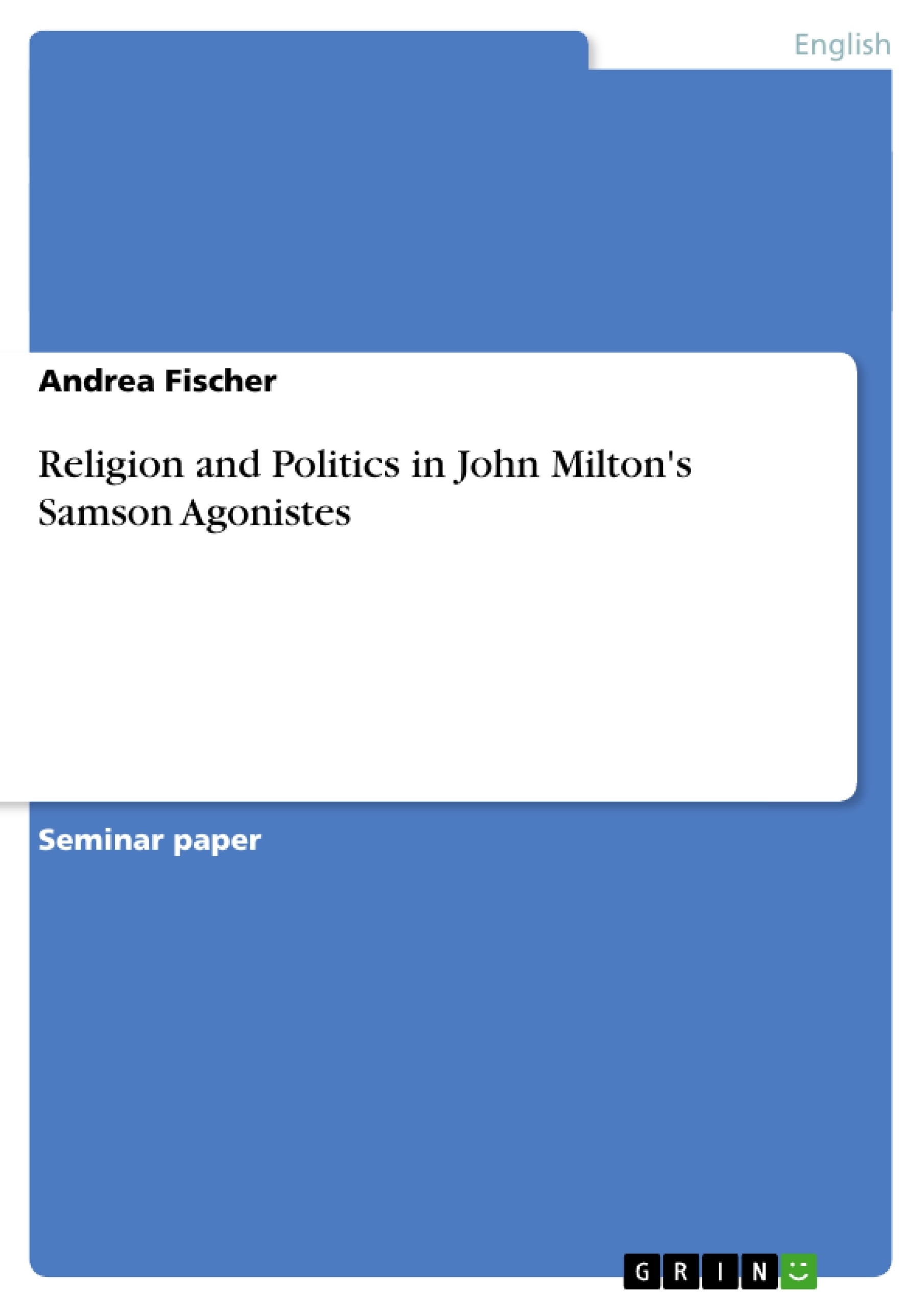Milton is one of the greatest poets of the English language. His career as a poet was marked by private tragedies and public controversies. Samson Agonistes is a piece of work, which was composed by Milton not as a pure didactic exercise but also as extended personal meditation. It seems to be one of his attempts to justify the ways of God to himself and thereby establish a vision of Christian heroism that answers the fears and misgivings of his own heart and mind. Samson Agonistes also shows Milton′s struggle with politics after the defeat of the Good Old Cause in which he supported strongly. The events and emotions surrounding his composition Samson Agonistes had a great influence on this work.
Nobody knows exactly when Samson Agonistes was written but it is assumed that it was in a time where his own resurrection and salvation had begun and that he had taken Samson as a role model less numinous than Christ to express his inner feelings. Samson Agonistes is therefor more interesting as a religious, political and autobiographical play than as the classical, Greek tragedy or as the Christian comedy, as so many people have judged it.
In this term paper I will work out how much politics and religion have influenced Samson Agonistes and whether there are bibliographical correspondences between Milton and Samson.
[...]
Table of Contents
- I. Introduction
- II. Summary of Samson Agonistes
- III. Religious aspects in Samson Agonistes
- 3.1 Milton's religious faith
- 3.2 Samson Agonistes, a (religious) drama?
- 3.3 Samson Agonistes as a religious play
- 3.3.1 Samson as a religious figure
- 3.3.2 Religious interpretation of Samson Agonistes with examples of the text
- IV. Political aspects in Samson Agonistes by John Milton
- 4.1 Political background
- 4.1.1 Milton and the Regicides
- 4.2 Milton's political attitude
- 4.3 Samson Agonistes as a political drama
- 4.3.1 Samson as a political figure
- 4.3.2 Political interpretation of "Samson Agonistes" with examples of the text
- 4.1 Political background
- V. The problem of drawing autobiographical parallels between Milton and Samson
- VI. Conclusion
Objectives and Key Themes
This term paper aims to examine the influences of religion and politics on John Milton's "Samson Agonistes" and to explore the potential autobiographical parallels between the poet and his tragic hero. The paper will delve into Milton's personal religious beliefs and how they shaped his understanding of God's justice and man's free will. It will also analyze the political context of the play, considering the historical events and Milton's own political involvement. Finally, the paper will assess the extent to which Milton's own experiences and struggles are reflected in Samson's story.
- The influence of religion and politics on "Samson Agonistes"
- Milton's personal religious beliefs and their role in the play
- The political context of the play and Milton's involvement in the English Civil War
- The potential autobiographical parallels between Milton and Samson
- The nature of Christian heroism and the struggle with God's justice
Chapter Summaries
The first chapter provides an introduction to John Milton and his masterpiece, "Samson Agonistes." It highlights the personal and political context surrounding the play's creation, emphasizing the influence of Milton's own experiences on the work. The second chapter presents a concise summary of the biblical story of Samson, focusing on the final episode depicted in the play. It outlines the dramatic structure of the play and introduces the main characters, including Samson, his father Manoa, his wife Dalila, and the Philistine giant Harapha. The third chapter delves into the religious aspects of "Samson Agonistes." It examines Milton's own evolving religious beliefs and how they are reflected in the play. The chapter explores Samson's role as a religious figure and analyzes the religious themes and symbolism present in the play.
Keywords
Key terms and themes explored in this paper include John Milton, Samson Agonistes, religion, politics, autobiography, Christian heroism, God's justice, free will, political context, English Civil War, Puritanism, and religious drama.
- Quote paper
- Andrea Fischer (Author), 2001, Religion and Politics in John Milton's Samson Agonistes, Munich, GRIN Verlag, https://www.grin.com/document/7924




